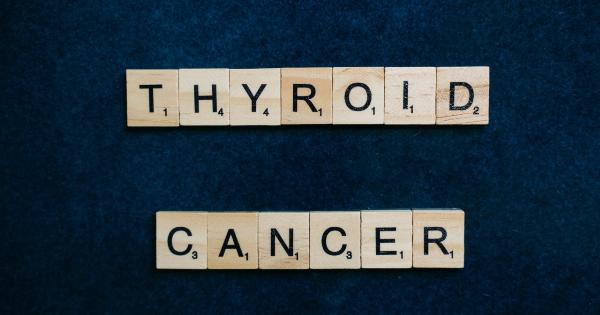World Thyroid Day is observed every year on May 25th to create awareness about thyroid-related disorders and their impact on our lives. Thyroid cancer is one of the most common types of cancer affecting millions of people worldwide.
According to the American Cancer Society, about 44,280 new cases of thyroid cancer will be diagnosed in the US in 2021. In this article, we will discuss the causes, symptoms, diagnosis, and treatment of thyroid cancer.
What is Thyroid Cancer?
The thyroid is a butterfly-shaped gland located in front of the neck. It produces hormones that regulate metabolism, heart rate, body temperature, and other vital functions.
Thyroid cancer occurs when the thyroid cells begin to grow uncontrollably, forming a mass or lump called a nodule. The nodule may be benign (non-cancerous) or malignant (cancerous).
Causes of Thyroid Cancer
The exact cause of thyroid cancer is unknown. However, certain factors that increase the risk of developing thyroid cancer include:.
- Exposure to radiation: People who have been exposed to radiation, especially during childhood, have a higher risk of developing thyroid cancer.
- Females: Thyroid cancer is more common in females than males.
- Age: The risk of thyroid cancer increases with age.
- Family history: A family history of thyroid cancer may increase the risk of developing the disease.
- Diet: A diet low in iodine may increase the risk of developing thyroid cancer.
Symptoms of Thyroid Cancer
Thyroid cancer may not cause any symptoms in its early stages. As the cancer grows, it may cause the following signs and symptoms:.
- A lump or swelling in the neck
- Hoarseness or difficulty speaking
- Pain in the neck or throat
- Difficulty swallowing or breathing
- Cough that does not go away
Diagnosis of Thyroid Cancer
Thyroid cancer is usually diagnosed through a combination of tests, including:.
- Physical examination: Your doctor may feel your neck to check for lumps or swelling.
- Blood tests: Blood tests may be done to check the levels of thyroid hormones in your blood.
- Ultrasound: An ultrasound uses sound waves to create images of the thyroid gland and can help identify nodules or masses.
- Fine-needle aspiration biopsy: A biopsy involves removing a small sample of tissue from a nodule or mass for analysis under a microscope to determine if it is cancerous or not.
Treatment of Thyroid Cancer
The treatment for thyroid cancer depends on the type and stage of cancer, as well as the individual’s overall health. Treatment options include:.
- Surgery: Surgery to remove all or part of the thyroid gland is the most common treatment for thyroid cancer. Depending on the extent of the cancer, the surgeon may also remove lymph nodes in the neck.
- Radiation therapy: Radiation therapy uses high-energy radiation to destroy cancer cells. It may be used in conjunction with surgery or to treat cancer that has spread to other parts of the body.
- Chemotherapy: Chemotherapy uses drugs to destroy cancer cells. It is not commonly used to treat thyroid cancer but may be used in rare cases.
- Targeted therapy: Targeted therapy uses drugs that specifically target cancer cells and prevent them from dividing and growing.
Prevention of Thyroid Cancer
There is no sure way to prevent thyroid cancer, but some steps that may reduce your risk include:.
- Avoid or limit exposure to radiation
- Eat a healthy diet rich in fruits, vegetables, and iodine-rich foods
- Regularly perform self-examination of the neck to check for any lumps or swelling
- Speak to your doctor about your family history of thyroid cancer
Conclusion
Thyroid cancer is a common type of cancer that affects millions of people worldwide. Early detection and timely treatment are crucial to managing the disease and improving outcomes.
If you experience any signs or symptoms of thyroid cancer, speak to your doctor immediately. Remember that prevention and early detection are key to managing thyroid cancer.



























